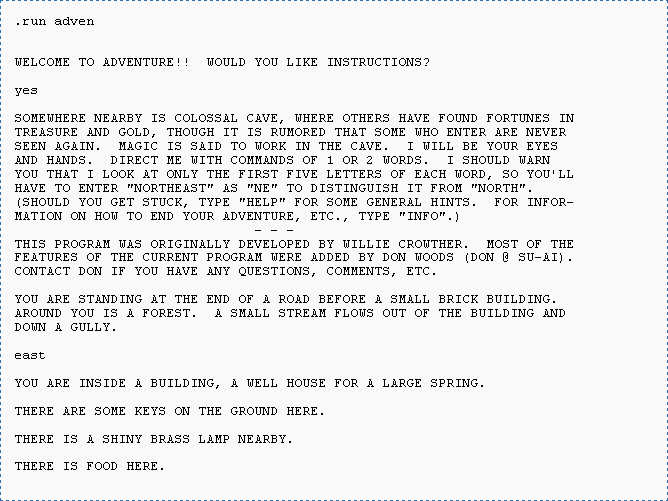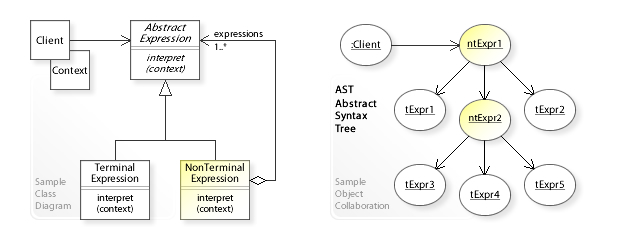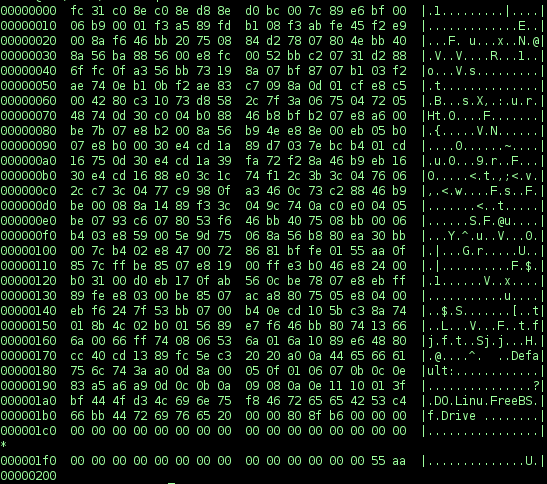|
Blorb
Blorb is a package format for interactive fiction games. Many such games incorporate resources such as sound effects, music, or pictures. Blorb's purpose is to bind these together into one file. The format was devised by Andrew Plotkin and is used in both the Z-machine and Glulx virtual machines, as well as by the Glk library. Concept In the days when games were distributed only on disk, there was no problem in associating a game with its resources: the resources were simply shipped on the same disk. Since all Z-machine games were produced by Infocom, there was also no chance that resources would be shipped in a format which a user's interpreter program could not handle. Blorb is needed because neither of these assumptions hold true in modern times: games are typically downloaded as single files, and a user may be using any of a large number of interpreters. A Blorb file may optionally include the executable code of the game itself. This allows authors of modern games to shi ... [...More Info...] [...Related Items...] OR: [Wikipedia] [Google] [Baidu] |
Interactive Fiction
'' Interactive fiction, often abbreviated IF, is software simulating environments in which players use text commands to control characters and influence the environment. Works in this form can be understood as literary narratives, either in the form of interactive narratives or interactive narrations. These works can also be understood as a form of video game, either in the form of an adventure game or role-playing game. In common usage, the term refers to text adventures, a type of adventure game where the entire interface can be " text-only", however, graphical text adventures still fall under the text adventure category if the main way to interact with the game is by typing text. Some users of the term distinguish between interactive fiction, known as "Puzzle-free", that focuses on narrative, and "text adventures" that focus on puzzles. Due to their text-only nature, they sidestepped the problem of writing for widely divergent graphics architectures. This feature meant that i ... [...More Info...] [...Related Items...] OR: [Wikipedia] [Google] [Baidu] |
Glulxe
Glulx is a 32-bit portable virtual machine intended for writing and playing interactive fiction. It was designed by Andrew Plotkin to relieve some of the restrictions in the venerable Z-machine format. For example, the Z-machine provides native support for 16-bit integers, while Glulx natively supports 32-bit integers. Versions and popularity The Inform compiler, starting with version 6.30, can produce either Z-machine or Glulx story files. A Spanish interactive fiction development system called Superglús also uses Glulx. Despite being a better-adapted virtual machine for modern computing hardware and being just as accessible to developers, Glulx continues to lag behind the Z-machine in popularity, largely due to the comparative rarity of interpreters. The most popular interpreter for Glulx is Andrew Plotkin's Glulxe. Glulxe uses the Glk API for input and output. File and email extensions The MIME type for Glulx is "application/x-glulx". Glulx files have the file extension ... [...More Info...] [...Related Items...] OR: [Wikipedia] [Google] [Baidu] |
Glulx
Glulx is a 32-bit portable virtual machine intended for writing and playing interactive fiction. It was designed by Andrew Plotkin to relieve some of the restrictions in the venerable Z-machine format. For example, the Z-machine provides native support for 16-bit integers, while Glulx natively supports 32-bit integers. Versions and popularity The Inform compiler, starting with version 6.30, can produce either Z-machine or Glulx story files. A Spanish interactive fiction development system called Superglús also uses Glulx. Despite being a better-adapted virtual machine for modern computing hardware and being just as accessible to developers, Glulx continues to lag behind the Z-machine in popularity, largely due to the comparative rarity of interpreters. The most popular interpreter for Glulx is Andrew Plotkin's Glulxe. Glulxe uses the Glk API for input and output. File and email extensions The MIME Multipurpose Internet Mail Extensions (MIME) is an Internet standard that ... [...More Info...] [...Related Items...] OR: [Wikipedia] [Google] [Baidu] |
Andrew Plotkin
Andrew Plotkin (born May 15, 1970), also known as Zarf, is a central figure in the modern interactive fiction (IF) community. Having both written a number of award-winning games and developed a range of new file formats, interpreters, and other utilities for the design, production, and running of IF games, Plotkin is widely recognised for both his creative and his technical contributions to the homebrew IF scene. Interactive fiction Plotkin was one of the earliest writers to use Graham Nelson's Inform development system, and one of the first since Infocom's heyday to explore the boundaries of interactive fiction as an artistic medium. Many later authors cite him as a primary influence. He has won many awards within the community, and is frequently interviewed for magazine articles about interactive fiction. Plotkin has also made major technical contributions to the interactive fiction medium, designing the Blorb archive format, the Glk I/O platform, and the Glulx virtual mach ... [...More Info...] [...Related Items...] OR: [Wikipedia] [Google] [Baidu] |
Infocom
Infocom was an American software company based in Cambridge, Massachusetts, that produced numerous works of interactive fiction. They also produced a business application, a relational database called ''Cornerstone (software), Cornerstone''. Infocom was founded on June 22, 1979, by staff and students of Massachusetts Institute of Technology, and lasted as an independent company until 1986, when it was bought by Activision. Activision shut down the Infocom division in 1989, although they released some titles in the 1990s under the Infocom ''Zork'' brand. Activision abandoned the Infocom trademark in 2002. Overview Infocom games are text adventures where users direct the action by entering short strings of words to give commands when prompted. Generally the program will respond by describing the results of the action, often the contents of a room if the player has moved within the virtual world. The user reads this information, decides what to do, and enters another short serie ... [...More Info...] [...Related Items...] OR: [Wikipedia] [Google] [Baidu] |
Filename Extension
A filename extension, file name extension or file extension is a suffix to the name of a computer file (e.g., .txt, .docx, .md). The extension indicates a characteristic of the file contents or its intended use. A filename extension is typically delimited from the rest of the filename with a full stop (period), but in some systems it is separated with spaces. Other extension formats include dashes and/or underscores on early versions of Linux and some versions of IBM AIX. Some file systems implement filename extensions as a feature of the file system itself and may limit the length and format of the extension, while others treat filename extensions as part of the filename without special distinction. Usage Filename extensions may be considered a type of metadata. They are commonly used to imply information about the way data might be stored in the file. The exact definition, giving the criteria for deciding what part of the file name is its extension, belongs to the rules of th ... [...More Info...] [...Related Items...] OR: [Wikipedia] [Google] [Baidu] |
MIME
Multipurpose Internet Mail Extensions (MIME) is an Internet standard that extends the format of email messages to support text in character sets other than ASCII, as well as attachments of audio, video, images, and application programs. Message bodies may consist of multiple parts, and header information may be specified in non-ASCII character sets. Email messages with MIME formatting are typically transmitted with standard protocols, such as the Simple Mail Transfer Protocol (SMTP), the Post Office Protocol (POP), and the Internet Message Access Protocol (IMAP). The MIME standard is specified in a series of requests for comments: , , , , and . The integration with SMTP email is specified in and . Although the MIME formalism was designed mainly for SMTP, its content types are also important in other communication protocols. In the HyperText Transfer Protocol (HTTP) for the World Wide Web, servers insert a MIME header field at the beginning of any Web transmission. Clients ... [...More Info...] [...Related Items...] OR: [Wikipedia] [Google] [Baidu] |
Enchanter (computer Game)
Enchanter may refer to: Magic and paranormal * Enchanter (paranormal), a practitioner of magic which has the ability to attain objectives using supernatural or nonrational means ** Enchanter (fantasy), someone who uses or practices magic that derives from supernatural or occult sources *Seduction, the enticement of one person by another, called a seducer or enchanter when it is a handsome and charismatic man Entertainment * ''Enchanter'' (manga), a 2002 manga series by Izumi Kawachi * ''Enchanter'' (novel), a 1996 novel by Sara Douglass *''The Enchanter'', a 1939 novella by Vladimir Nabokov Games * ''Enchanter'' (video game), a 1983 interactive fiction game by Infocom Other *The Enchanter, a nickname for Martin Van Buren, the eighth president of United States See also * * Enchant (other) Enchant may refer to: * Performing an incantation * Enchant (band), a progressive rock band * ''Enchant'' (album), a 2003 album by Emilie Autumn * Enchant (software), a ... [...More Info...] [...Related Items...] OR: [Wikipedia] [Google] [Baidu] |
Nitfol
The Z-machine is a virtual machine that was developed by Joel Berez and Marc Blank in 1979 and used by Infocom for its text adventure games. Infocom compiled game code to files containing Z-machine instructions (called story files or Z-code files) and could therefore port its text adventures to a new platform simply by writing a Z-machine implementation for that platform. With the large number of incompatible home computer systems in use at the time, this was an important advantage over using native code or developing a compiler for each system. History The "Z" of Z-machine stands for Zork, Infocom's first adventure game. Z-code files usually have names ending in .z1, .z2, .z3, .z4, .z5, .z6, .z7, or .z8, where the number is the version number of the Z-machine on which the file is intended to be run, as given by the first byte of the story file. This is a modern convention, however. Infocom itself used extensions of .dat (Data) and .zip (ZIP = Z-machine Interpreter Program), ... [...More Info...] [...Related Items...] OR: [Wikipedia] [Google] [Baidu] |
Interpreter (computing)
In computer science, an interpreter is a computer program that directly executes instructions written in a programming or scripting language, without requiring them previously to have been compiled into a machine language program. An interpreter generally uses one of the following strategies for program execution: # Parse the source code and perform its behavior directly; # Translate source code into some efficient intermediate representation or object code and immediately execute that; # Explicitly execute stored precompiled bytecode made by a compiler and matched with the interpreter Virtual Machine. Early versions of Lisp programming language and minicomputer and microcomputer BASIC dialects would be examples of the first type. Perl, Raku, Python, MATLAB, and Ruby are examples of the second, while UCSD Pascal is an example of the third type. Source programs are compiled ahead of time and stored as machine independent code, which is then linked at run-time and executed by ... [...More Info...] [...Related Items...] OR: [Wikipedia] [Google] [Baidu] |
Copyright Infringement Of Software
Copyright infringement (at times referred to as piracy) is the use of works protected by copyright without permission for a usage where such permission is required, thereby infringing certain exclusive rights granted to the copyright holder, such as the right to reproduce, distribute, display or perform the protected work, or to make derivative works. The copyright holder is typically the work's creator, or a publisher or other business to whom copyright has been assigned. Copyright holders routinely invoke legal and technological measures to prevent and penalize copyright infringement. Copyright infringement disputes are usually resolved through direct negotiation, a notice and take down process, or litigation in civil court. Egregious or large-scale commercial infringement, especially when it involves counterfeiting, is sometimes prosecuted via the criminal justice system. Shifting public expectations, advances in digital technology and the increasing reach of the Internet ... [...More Info...] [...Related Items...] OR: [Wikipedia] [Google] [Baidu] |
Executable
In computing, executable code, an executable file, or an executable program, sometimes simply referred to as an executable or binary, causes a computer "to perform indicated tasks according to encoded instruction (computer science), instructions", as opposed to a data (computing), data file that must be interpreted (parser, parsed) by a program to be meaningful. The exact interpretation depends upon the use. "Instructions" is traditionally taken to mean machine code instructions for a physical central processing unit, CPU. In some contexts, a file containing scripting instructions (such as bytecode) may also be considered executable. Generation of executable files Executable files can be hand-coded in machine language, although it is far more convenient to develop software as source code in a high-level language that can be easily understood by humans. In some cases, source code might be specified in assembly language instead, which remains human-readable while being close ... [...More Info...] [...Related Items...] OR: [Wikipedia] [Google] [Baidu] |

_(6120466941).jpg)



